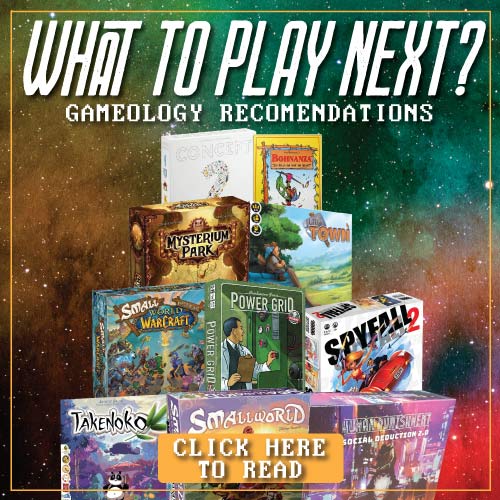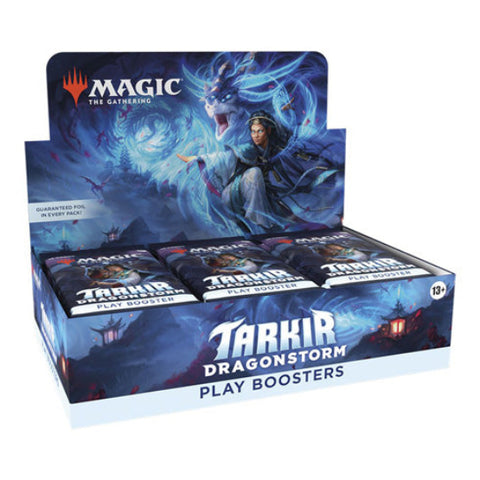What to Play Next - Board Game Recommendations
Posted by GAMEOLOGY

If you’ve come into our Gameology retail store looking for recommendations, one of the first things our staff probably ask you is:
“What other games do you like?”
I’ve probably asked you (yes, you, reading this) that exact question!
However, if you have never been to our retail store before, here’s a blog post full of board game recommendations based on what you already like!
*
If You Like...Catan
You’ll Like...Bohnanza or Little Town
If the trading and high level of player interaction is what you and your gaming group love about Catan, you’ll love the card game, Bohnanza.
Your aim of the game is to plant large quantities of a specific bean variety (eg: chilli beans) and then harvest them to make the max amount of money. However, the trick of Bohnanza is that every turn, you are dealt two bean cards and, unless you can trade them away, you will be forced to plant them in your fields, harvesting your poor chilli beans before they had a chance to grow up. And here’s where the trading comes in. There’s shouting, undercutting, bribery--made all the more hilarious when you realise you’re arguing over derpy looking beans.
If you love board games that, like Catan, get people looking not completely at the board but at their fellow players, Bohnanza will surely be a hit.
However, if your love for Catan stems more from the resource generation aspects, you might find more luck with Little Town.
This adorably small worker placement game places you as a team of builders and architects, tasked with collecting resources and money to build a town. Each turn, when you place a worker, you gain resources from all the surrounding spaces—similar to how Catan grants you resources depending on the tiles surrounding your settlements. With the resources you gain, you can create buildings. The interesting part is that both you and your opponents can utilise these buildings.
Small and light but still strategic, Little Town melds the resource generation of Catan with worker placement, making it a perfect next step.
If You Like…Ticket to Ride
You’ll Like...Power Grid or Takenoko
If you’re looking for a jump in complexity from the humble Ticket to Ride, look no further than Power Grid.
In Power Grid, your goal is to supply power to cities—and do it better than your opponents. Will you power your city through free, but low-power green energy? Will you go all out and get uranium power plants? Or will you go the classic route with coal and oil? Each turn, you will bid on power plants for your company, buy the resources you need to run those power plants, and build out your network. There are a lot of more phases in a game of Power Grid than one of Ticket to Ride, but the reason I recommend this game is because you require the same kind of spatial mapping between cities, planning where you want to expand to next. The difference is in this game, you’re routing power, not trains.
If you’re starting to get tired of Ticket to Ride and are willing to invest the time to grasp some new mechanics, Power Grid will be an extremely rewarding and strategic experience.
Maybe Power Grid sounds like a bit too much right now, but you still want something offering fresh mechanics. Here, I will recommend Takenoko.
At its core, Takenoko is a cute game about growing bamboo. Each turn, you will have a set amount of action points to spend on performing a variety of actions—be that irrigating a piece of land, growing a certain colour of bamboo, or even moving the panda to a plot of land and eating the bamboo! In Takenoko, what’s similar to Ticket to Ride are the goal cards you get throughout the game. Where in Ticket to Ride, your goal might be to connect London and Paris, here, your goal might be to have the panda eat four pieces of pink bamboo.
Though this game has a different feel to Ticket to Ride, it offers a small jump in complexity while retaining a light-hearted theme that will appeal to kids.
If You Like…Codenames
You’ll Like...Concept or Mysterium Park
Codenames is such a good board game because of how neutral it is. You can play it with people of all ages and it’s fit for all occasions and moods—whether that’s Christmas with the whole family or a simple weeknight.
If you’re looking for a game similarly easy to get to the table, Concept is what I would recommend. Put simply, it is charades as a board game. Each turn, a team of two players choose a word from a secret card that the other players need to guess. Then, they start placing small cubes on the variety of icons on the board. Perhaps the word they need to guess is coffee. They might place a cube on the icon signifying food or drink and then another on the icon featuring the colour brown.
Like Codenames, Concept has the same opportunities for clever clue-giving and subsequent fun discussions, bundled in a simple and inoffensive package, making it the perfect recommendation.
If your group wants something a little more thematic though, your perfect next game is Mysterium Park—the newly released mini version of classic thematic co-op game, Mysterium.
Where Mysterium can be tedious to set up and explain, Mysterium Park simplifies that with a setup quite similar to Codenames. In Mysterium Park, the fairground’s director has mysteriously disappeared. A ghost now haunts the park and a group of psychics are called in to help investigate its cryptic visions. Using only beautiful but strange illustrations (similar to those in Dixit), the ghost must communicate with the psychics and help them rule out potential suspects and locations, until they have narrowed it down to the true killer. Like both Codenames and Concept, Mysterium Park will have your group in deep discussion over cryptic clues.
With its beautiful artwork and similar playstyle to Codenames, Mysterium Park is definitely one to put on the wishlist if you love Codenames.
If You Like…Secret Hitler
You’ll Like...Spyfall 2 or Human Punishment Social Deduction 2.0
For a social deduction game that’s a little lighter and shorter than Secret Hitler, try Spyfall 2.
In Spyfall 2, a variety of location cards will be laid out in the centre of the table. A location will secretly be chosen and everyone will be dealt a card with that location on it and the job they have in this location. All except one person, whose card will simply read: “Spy”. This player will have no idea where everyone else is. Then the questions start. Players must ask each other any questions they can think of—from “What are we wearing today?” to “Why is the sky blue?”—trying to suss out who the spy is.
Spyfall 2 is a brilliant next step from Secret Hitler because it encourages creativity and cunning in both the questions you ask and who you ask. There’s also a nice opportunity to roleplay your character—whether that’s a lion tamer at the zoo or a bouncer at the jazz club.
Perhaps you want your social deduction more complex. For that, the perfect game for you is Human Punishment Social Deduction 2.0 (ignore its mouthful of a title).
Rated 7.9 on BoardGameGeek at the time of writing, this is a social deduction game that goes beyond being a simple party game. It’s described as being more of a social experiment than a simple board game. Unlike many social deduction games where your role is fixed, in Human Punishment, your allegiances can change many times throughout the game. However, instead of there simply being a binary of good guys and bad guys, Human Punishment features Humans, Machines, Outlaws, the Legion and the Fallen, all of which have interactions and alliances far more complex than simply “I don’t like them, they should die”.
A rich and tense experience, Human Punishment is the game to get if you want more from Secret Hitler.
If You Like…Risk
You’ll Like...Small World or Small World of Warcraft
Now, this might be cheating a little bit since technically, Small World and Small World of Warcraft are the same game. But I think it’s such a great recommendation after Risk that I had to put both versions in.
Honestly, I don’t love Risk. The randomness of the dice rolls, the boringness of your units, it all feels a little outdated for me. However, Small World changes all that by giving you more consistent combat but, more importantly, wild, fun and wacky units to play with. In both Small World and Small World of Warcraft, you are trying to claim as much land as possible to earn the most coins. But if you want to take over the land, you’ll need units. In Small World, units are a randomised combination of a race and a trait. Perhaps you have Stout Amazons one game, but the next you’ll have Mystic Amazons. Each trait and race has their own power that, when combined, make for hilarious results. Even more interesting though, is that you aren’t stuck with the same units all game. Over the course of the game, you can acquire new units, putting your previous armies in decline. Don’t be scared though: if you love the satisfaction of claiming your opponent’s land and killing their units in Risk, you still get that with Small World, but with much more variety and fun.
If you love the World of Warcraft theme, Small World of Warcraft is the obvious choice, but even if you aren’t a WoW fan, it might be worth getting this version because of the refined rules and mechanics that come with the newer version. However, even with the original version, you are getting a quick, competitive area control game that scratches the same itch as the classic Risk.
And there we have it! Our board game recommendations based on what you already like! I hope this helps you and your gaming group find the perfect next game to play. Do you have any more recommendations to add to our list? Leave them in the comments below!





































